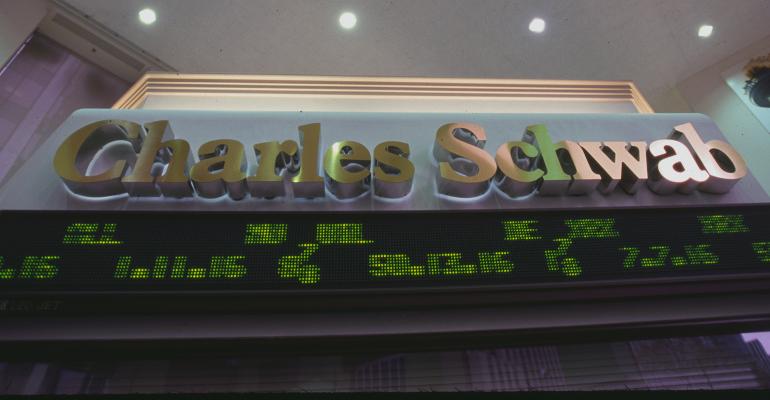Industry observers and technology providers are in agreement that a combined Charles Schwab and TD Ameritrade would have implications for advisor technology, but not everyone is convinced the tech offered at a combined firm would benefit all advisors. Serving such a broad cross section of advisors could make prioritizing innovation more complicated and problematic than it previously was—and a combined firm could even leave room for others to swoop in and chip away at the firms’ hold on assets, say some.
“Both of those firms have focused on different segments,” said Alois Pirker, research director at Aite Group’s wealth management division. TD Ameritrade has a large proportion of smaller, state-registered RIAs and its advisor customers tend to skew younger and place more importance on technology. Schwab’s advisor clients, on the other hand, tend to have more assets than those at TD Ameritrade, are older and perhaps less concerned with what technology is being offered. “The big question is, can [they] consolidate [their] custody platforms?” he asked. “Are they going to maintain two platforms?”
TD Ameritrade represents an open-architecture philosophy, one that Schwab is only recently beginning to accelerate with its commitment to new technology and adding integrations under the leadership of Andrew Salesky, head of advisory technology. “There are two competing integration strategies here,” added Pirker. “Getting those two things right is a tricky element.”
It is too soon to tell who might take the helm of a unified technology stack, but analysts suggested that given the scale at play, Schwab's technology roadmap under Salesky's guidance would likely drive the strategy going forward.
There is already conjecture that if Schwab's Salesky were in charge, TD Ameritrade’s Veo platform might not receive the attention it currently enjoys, and advisors using the platform might be in for a rude surprise. “It would be a disservice to see that go, but what are you going to do?” asked Pirker. “Do you really kick TD Veo to the curb here?”
From a technology standpoint, TD Ameritrade is simpler to work with than either Schwab or Fidelity, said Jason Wenk, founder and CEO of RIA-focused, commission-free custodian Altruist. His firm has integrations that allow advisors to see assets held at Schwab, TD Ameritrade Institutional and Fidelity.
“One of the niceties of TD is that when an advisor signs up, they have a little bit simpler flow to get an advisor to even gain access to their data,” said Wenk. “Amongst all of the custodians, anyway, they have the simplest process.”
TD’s APIs are also more accessible and easier to work with than the APIs offered by Schwab and Fidelity, he said.
Another casualty of the acquisition could be so-called “soft dollars,” where custodians might cover RIA expenses like software bills, said Wenk. “Schwab and TD won’t really be competing against each other, so there’s a lot less likelihood for them to offer discounts or waive or cover costs of new accounts,” he said.
If those funds dry up, innovation could suffer. “A pretty big chunk of revenue of the major tech companies is actually paid to them by the custodians," Wenk said. "That’s already kind of looking like it’ll be phased out because of the zero commission move.”
While TD Ameritrade may have a reputation as nimbler and more innovative than its competitors, Schwab is such a strategic-thinking firm that the combination of the two will only benefit advisors, countered Eric Clarke, CEO of wealthtech provider Orion Advisor Solutions. His firm works with both custodians.
Advisors shouldn’t be worried about a loss of competition or fewer options in the marketplace, Clarke said. “I really, really believe this is a really positive outcome for independent advisors, because the benefit of this merger has already played out in the marketplace,” he added. “That benefit is zero trading costs.”
In fact, an acquisition that consolidates big players might leave space for startups like Altruist or others. “You are going to have loads of opportunities for other firms to come in and serve that smaller RIA segment,” Pirker said, adding that advisors might see Goldman Sachs take advantage of the acquisition to market its recently acquired FinLife Partners.
Ultimately, the tech innovations that have driven pricing shifts, particularly $0 trades, are creating an environment where consolidation and scale make sense, said Clarke.
“It not only benefits the investor, but the advisor should benefit too, because they ought to be able to recruit brokers from [wirehouses] at a faster clip than ever before,” Clarke said. “They've got that distinct custody advantage where those advisors and their clients don’t have trading fees associated with their accounts anymore.”
“Would we rather have more custody choices and have the investor continue to pay those trading costs? Or would you rather have a few less choices and lower the trading costs?” asked Clarke. “I think the answer is the latter.





